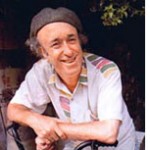By Dan Bloom

CHIAYI CITY, Taiwan — When I heard recently that the well-known sci-fi novelist Alan Dean Foster was one of the contributors included in a new anthology of science fiction stories titled Loosed Upon the World, I sent him an email to his home in Arizona and asked what it was like growing up Jewish as a kid in New York and how it might have influenced his desire to become a SF writer when he grew up.
“Growing up Jewish, it was expected that I and my sister would be reading at university level by at least the time we entered high school,” he told San Diego Jewish World. “Science-fiction triggered my imagination early, so when I started writing, it was SF.”
He signed his note, with a dash of Yiddishkeit and friendly humor, writing “shalom and nihao,” knowing that I am living in a Chinese-speaking country across the Pacific.
Foster’s story in the Loosed Upon the World sci-fi anthology, due out this summer, and his story is titled “That Creeping Sensation.” He wrote it in 2011.
Another Jewish SF writer included in the collection is the Brooklyn-born Robert Silverberg, in his 80s now, with a story titled “Hot Sky.”
John Joseph Adams put the anthology together, and as one of the top editors in the world of science fiction, he knows everyone in the field and every book and short story as well. He was the perfect man for the job.
This anthology, however, as readers will find out when they start reading the stories, is about climate change. In fact, all the stories reflect that theme in one way or another, from Jean-Louis Trudel’s ”The Snows of Yesteryear” to Charlie Jane Ander’s ”The Day It All Ended.”
Sci-fi writers have long been interested in climate change and global warming, from Arthur Herzog’s novel Heat in 1977 to the late great Isaac Asimov’s essays and YouTube videos.
Long before ”climate change” was a phrase on every American politician’s lips, science fiction has considered the things we humans have done — are doing — to our world. As a genre chiefly concerned with looking to the future, it’s only natural for many SF writers to have explored how humans are impacting it today, or if, as a species, there even be a future.
So with Paolo Bacigalupi’s much-anticipated novel The Water Knife about future ”water wars” in the American southwest and California’s scary and prolonged drought, Adams’ collection comes with very good timing.
Adams’ anthology is a collection of climate stories from 27 of today’s most highly acclaimed genre writers. The stories are provocative and speculate about what tomorrow might bring. In addition to the stories by Foster and Silverberg, there’s work by Margaret Atwood, Nancy Kress and Kim Stanley Robinson, among others.
Adams speaks his mind, too.
“As someone who has edited numerous anthologies about the apocalypse, one thing that is very easy to see is this: climate change is an apocalypse-in-progress,” he says. “And when the head of the U.S. Senate Environment and Public Works Committee is the author of a book calling climate change ‘the greatest hoax,’ and says things like, ‘Man can’t change climate [only God can],’ it can feel like we’re living inside a dystopian novel.”
So why a sci-fi collection about climate change and why now?
Adams says that one of the things that fiction can do really well is to help readers contextualize the world around them.
“I thought it would be interesting to do an anthology of stories specifically about climate change — that, by approaching the topic in the realm of fiction, we can perhaps humanize and illuminate the issue in ways that aren’t as easy to do with only science and cold equations,” he told San Diego Jewish World. “It’s my hope that the anthology can serve as a warning flare, to show people the kinds of things we can expect if climate change goes unchecked, but also to show some of the possible solutions, to show some of the hope that we can, maybe, still do something about it before it’s too late.”
As I ended the interview, I asked Adams if he had heard of the ‘cli-fi’ term yet, and he said he had.
“As for cli-fi, naturally I’ve heard it,” he said in an email. “It would have been difficult to do this book without encountering it, surely.”
When I asked him how one might classify Bacigalupi’s new novel “The Water Knife,” which is set in the near future but seems drawn from today’s newspaper headlines, he said he would call it both cli-fi and science fiction, adding: ”I don’t see the two [genres ] as being mutually exclusive.”
*
Bloom, based in Taiwan, is an inveterate web surfer and cli-fi enthusiast. Your comment may be sent to dan.bloom@sdjewishworld.com, or posted on this website per the instructions below.